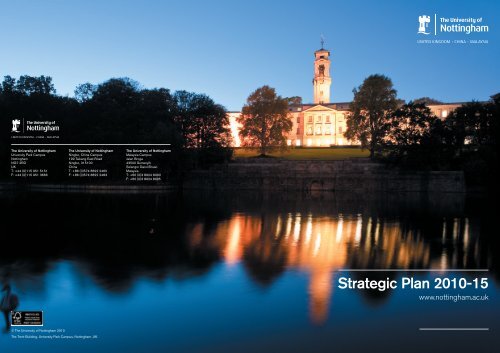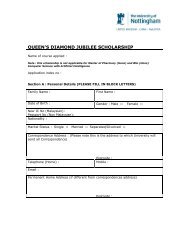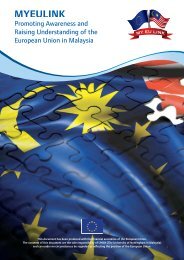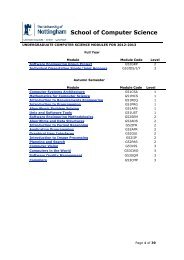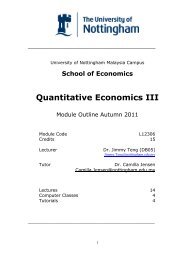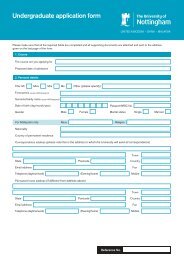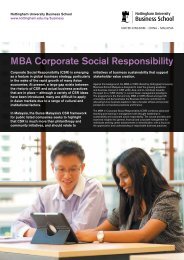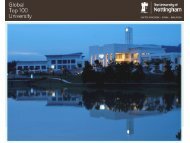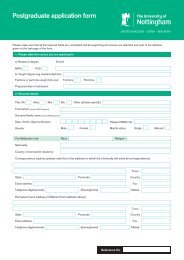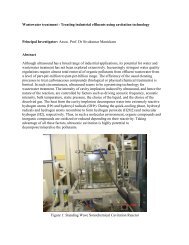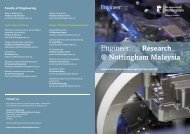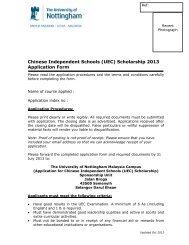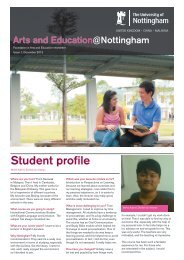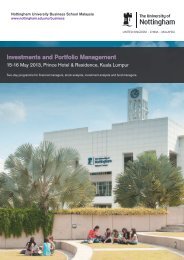Strategic Plan 2010-15 - University of Nottingham
Strategic Plan 2010-15 - University of Nottingham
Strategic Plan 2010-15 - University of Nottingham
- No tags were found...
You also want an ePaper? Increase the reach of your titles
YUMPU automatically turns print PDFs into web optimized ePapers that Google loves.
The <strong>University</strong> <strong>of</strong> <strong>Nottingham</strong><strong>University</strong> Park Campus<strong>Nottingham</strong>NG7 2RDUKT: +44 (0)1<strong>15</strong> 951 5<strong>15</strong>1F: +44 (0)1<strong>15</strong> 951 3666The <strong>University</strong> <strong>of</strong> <strong>Nottingham</strong>Ningbo, China Campus199 Taikang East RoadNingbo, 3<strong>15</strong>100ChinaT: +86 (0)574 8822 2460F: +86 (0)574 8822 2483The <strong>University</strong> <strong>of</strong> <strong>Nottingham</strong>Malaysia CampusJalan Broga43500 SemenyihSelangor Darul EhsanMalaysiaT: +60 (0)3 8924 8000F: +60 (0)3 8924 8005<strong>Strategic</strong> <strong>Plan</strong> <strong>2010</strong>-<strong>15</strong>www.nottingham.ac.uk© The <strong>University</strong> <strong>of</strong> <strong>Nottingham</strong> <strong>2010</strong>The Trent Building, <strong>University</strong> Park Campus, <strong>Nottingham</strong>, UK.
<strong>University</strong> <strong>Plan</strong> <strong>2010</strong>-20<strong>15</strong><strong>University</strong> <strong>Plan</strong> <strong>2010</strong>-20<strong>15</strong>ContentsIntroduction 2/01 Mission, Vision and Guiding Principles 4/02 Excellence in Education 6/03 World-Changing Research 14/04 Engaging with Business 20/05 Global Reach 24/06 <strong>University</strong> Life 30/07 Our Environment 36/08 Social Responsibility 42/09 Sustaining Excellence 46<strong>University</strong> <strong>of</strong> <strong>Nottingham</strong> students relaxing in the Lakeside Art Centre,<strong>University</strong> Park Campus, <strong>Nottingham</strong>, UKThis <strong>Plan</strong> was approved by Council at its 22 June <strong>2010</strong> meeting. This version omits material that is not<strong>of</strong> general or public interest. For the full version, or for additional hard copies, contact the <strong>University</strong>’s<strong>Plan</strong>ning and Management Information Division, at planning@nottingham.ac.uk.1
<strong>University</strong> <strong>Plan</strong> <strong>2010</strong>-20<strong>15</strong>IntroductionWe are living through a period <strong>of</strong> remarkable turbulence,triggered by the global financial crisis and sustainedby its aftershocks. Chief among the latter are theadjustments required to repair shattered public financesin many OECD countries (not least in the UnitedKingdom) and the background uncertainty createdby these developments.Uncertainty always makes planning more difficult,especially when that means looking out over a five yearperiod. But it should never be a reason for indecision.That only creates more uncertainty and paves the wayfor stagnation rather than progression.This <strong>Strategic</strong> <strong>Plan</strong> covers the period from <strong>2010</strong>through to 20<strong>15</strong>. Its preparation has involvedextensive analysis <strong>of</strong> the risks and challenges we willface over this period, the assets we can leverage andresources we can deploy, not only to meet thosechallenges, but to build an even stronger, morecompetitive and distinctive institution. In getting tothis point, the <strong>Plan</strong> has undergone unprecedentedconsultation within the <strong>University</strong>, a process whichhas greatly enriched it.Our <strong>Plan</strong> recognises and explicitly confronts the majorchallenges ahead: increased competition to attract thebest students and staff; delivering the highest qualityteaching and learning in an increasingly digitalenvironment; <strong>of</strong>fering facilities which underpin arewarding and enriching student experience; recruitingand retaining researchers who can deliver worldchangingresearch on global problems; confronting theemergence <strong>of</strong> Asia as a major competitor; and reducingour carbon footprint. We have to meet these challengesagainst a backcloth <strong>of</strong> sharp reductions in publicfunding which will almost certainly persist throughoutthe planning horizon.This sounds very challenging. It is. But we set out todeliver the ambition in this <strong>Plan</strong> from a very good place.We are an asset-rich <strong>University</strong>. At our core is atalented and committed workforce: academic,pr<strong>of</strong>essional, technical and operational. We are acomprehensive <strong>University</strong> and our size and scale arecentral to both our resilience in meeting challengesand capacity to respond to new opportunities.We are fortunate in having quite extraordinarycampuses, which are an essential ingredient <strong>of</strong> the<strong>Nottingham</strong> experience, and make this a special placeto live, study and work. We have a unique globalfootprint, with our campuses in Malaysia and China,the value <strong>of</strong> which is becoming ever more apparentin our increasingly globalised world. We have anenormous and supportive alumni community. Last,but not least, we are financially stable.I am therefore optimistic about our future. We have setourselves ambitious targets. But they are achievable.Not that I take achievement as given. That will onlyfollow with sustained application <strong>of</strong> our collectiveenergies, enterprise and adaptability. It will also requirecontinued investment in our human resources andinfrastructure, which is very much in our own hands.If we manage ourselves effectively and efficiently anddiversify our income streams, we will be able tomaximise investment in our future.I commend this <strong>Strategic</strong> <strong>Plan</strong> to the entire <strong>University</strong>community and look forward to working with you torealise the ambitions it sets out.Pr<strong>of</strong>essor David GreenawayVice-Chancellor<strong>University</strong> <strong>of</strong> <strong>Nottingham</strong> students in the Sir Colin CampbellBuilding, Jubilee Campus, <strong>Nottingham</strong>, UK.23
<strong>University</strong> <strong>Plan</strong> <strong>2010</strong>-20<strong>15</strong> <strong>University</strong> <strong>Plan</strong> <strong>2010</strong>-20<strong>15</strong>/01Mission,Vision andGuidingPrinciplesMissionAt The <strong>University</strong> <strong>of</strong> <strong>Nottingham</strong> we are committed to providing atruly international education, inspiring our students, producingworld-leading research and benefiting the communities aroundour campuses in the UK, China and Malaysia. Our purpose is toimprove life for individuals and societies worldwide. By boldinnovation and excellence in all that we do, we make bothknowledge and discoveries matter.VisionTo be widely recognised as the first choice <strong>of</strong>:• students who want a top quality, international education• researchers who want the best opportunity to make asignificant global impact• businesses that want innovative partners who give theman edge on their competition.By attracting ambitious and talented students, staff, andbusiness partners, we will firmly establish ourselves among thetop ten UK universities by 20<strong>15</strong>, and both <strong>of</strong> our campuses inAsia will be recognised as leading higher education providerswithin their regions.Our vision is to be recognised around the world for oursignature contributions, especially in global food security,energy and sustainability, and health.Guiding PrinciplesExcellence in all we doFrom top quality teaching, research and pr<strong>of</strong>essionalmanagement that provide rounded support to all our studentsand staff, to our relationships with our alumni and communities,we aim for excellence in all areas.Academic freedom and curiosityAll academic staff and students should be able to follow theiracademic interests in order to engage in research, teachingand learning <strong>of</strong> the highest quality. We value learning andknowledge for their own sake, as well as for the social andeconomic benefit they can bring.A global perspectiveWe aim for all our activities to reflect and be relevant toan increasingly complex global society in order to producegraduates ready to succeed in it and discoveries thatimprove it.Innovation and entrepreneurialismJesse Boot said <strong>of</strong> our students in 1928 that ‘their work willlink still more closely with industry and science, add to thehonour <strong>of</strong> the City and help to increase the well-being <strong>of</strong>our nation.’ We will continue to encourage innovationthroughout the <strong>University</strong> community and be known forour entrepreneurship.Leadership in environmentalsustainabilityThe <strong>University</strong> prizes and preserves its environment.To us this means energy efficient and low carbon buildings,leadership and innovation in developing sustainabletechnologies, providing students and staff with relevant skills,and informed stewardship <strong>of</strong> beautiful campuses in threecountries encompassing parklands, tropical andurban environments.Partnership and collaborationWe take the initiative to engage with others:universities, governments, student associations, schools,businesses, charities and communities — locally, nationallyand internationally.Staff and student supportWe recognise our duty <strong>of</strong> care to all staff and students, and willprovide them with high quality support to facilitate thedevelopment <strong>of</strong> their intellectual, emotional, physical andspiritual wellbeing.Appreciating diversityWe are committed to understanding others’ opinions, beliefsand cultures. Respect and tolerance will characterise theconduct <strong>of</strong> our relationships with each other and with otherorganisations and communities.Equality <strong>of</strong> access and opportunityWe endorse the aim <strong>of</strong> widening participation in highereducation, and value the benefits <strong>of</strong> diversity in our staffand student communities.Social responsibilityWe are committed to fostering the broader social good,at the local and national level in the countries we operate in,as well as globally.TransparencyWe strive to be clear and open about what we do and why,and value the views <strong>of</strong> the whole <strong>University</strong> community.4 5
<strong>University</strong> <strong>Plan</strong> <strong>2010</strong>-20<strong>15</strong><strong>University</strong> <strong>Plan</strong> <strong>2010</strong>-20<strong>15</strong>/02: Excellence in Education /02: Excellence in EducationIntroductionA <strong>University</strong> <strong>of</strong> <strong>Nottingham</strong> education is distinguishedby a powerful combination <strong>of</strong> research-led teaching, anincreasingly international environment and curriculum,and innovative uses <strong>of</strong> technology.Research-led teaching and learning enables students tocreatively engage with new and exciting ideas, because activeresearchers lead nearly all teaching and students pursueprojects in world class learning facilities.The <strong>University</strong> <strong>of</strong> <strong>Nottingham</strong>’s vision <strong>of</strong> an education in aninternational university has taken it beyond what most othersattempt. Our campuses near Kuala Lumpur, Malaysia (UNMC)and in Ningbo, China (UNNC), are scholarly communities,together comprising nearly 8,000 students, leadingresearchers and teachers, and are well on their way to <strong>of</strong>feringthe rich subject mix that characterises <strong>Nottingham</strong>. The UKcampuses host more than 32,000 students (more than aquarter from outside the UK) and 1,400 academic staff.Together our three campus networks constitute a uniquetransnational teaching and learning environment hosting thelargest number <strong>of</strong> international students <strong>of</strong> any Britishuniversity. We actively recruit leading teachers and researchersfrom across the world and encourage interaction and mobility<strong>of</strong> students and staff between all our campuses. One <strong>of</strong> ourtop priorities is to further internationalise our curriculum.We have a strong record in developing learning technologiesand enthusiastically embrace the appropriate use <strong>of</strong> the latestinnovations for enriching teaching and learning at all levels, aswell as to enable mobility, flexibility and wider access.Our Principles• We listen carefully to our students and work inpartnership with the student body to achieve our mutualaims, maintaining an excellent relationship with the Students’Union (in the UK), as well as the Malaysia Campus StudentAssociation and the Students' Union <strong>of</strong> UNNC. Studentsevaluate the teaching and content <strong>of</strong> the modules they take,which shapes the evolving curriculum and helps us identifyand reward excellent teaching. We have also run our owninternal student satisfaction survey for <strong>15</strong> years, recognisethe importance <strong>of</strong> the National Student Survey and nowinvolve students on critical reviews <strong>of</strong> our Schools.• We maintain relevance by monitoring and analysing nationaland international trends in student choice and industry needsand engaging employers in developing our portfolio.• We extend learning beyond the classroom. We providestudents with a wide range <strong>of</strong> opportunities for personaland career development. We expect them to participate inextracurricular activities, and provide accreditation for many<strong>of</strong> the skills they acquire in the process, which enhancestheir employability and ability to manage their careerprogression and lifelong learning. This includes volunteeringwithin the local community, which reflects an understanding<strong>of</strong> education and social responsibility shared by the<strong>University</strong> and the Students’ Union.• The <strong>University</strong> works closely with the regional, nationaland global employers <strong>of</strong> our graduates and excels atmaking sure our students and employers engage directlywith each other.• We value diversity, because it is important for a vibrantscholarly community and for its own sake. People with arange <strong>of</strong> experiences and perspectives, whether in thelaboratory or seminar room, enrich the learning environmentand help us produce graduates better able to contribute toa diverse and global society. We are committed to equalaccess and opportunity, and to enabling the most able toparticipate in higher education, regardless <strong>of</strong> theirbackground or circumstances.• We welcome collaboration with other educators. The<strong>University</strong> is committed to sharing its excellence in educationthrough a number <strong>of</strong> open access initiatives and strategicpartnerships that allow university educators around the worldto make use <strong>of</strong> our teaching materials.Our PurposeTo contribute to having better educated, more socially andenvironmentally aware and responsible citizens around theworld, who are prepared to face the global problems <strong>of</strong> societyand make valuable contributions.As recipients <strong>of</strong> a significant amount <strong>of</strong> public funds, we havean obligation to support the government’s ambitions for thehigher education sector and the judgements it makes on behalf<strong>of</strong> taxpayers against competing priorities.Pro<strong>of</strong> <strong>of</strong> excellence and relevance is embodied in ourgraduates’ satisfaction, employability and long-term successin their chosen path.We have a strong recordin developing learningtechnologies andenthusiastically embracethe appropriate use <strong>of</strong> thelatest innovations forenriching teaching andlearning at all levels, aswell as to enable mobility,flexibility and wider access.89
<strong>University</strong> <strong>Plan</strong> <strong>2010</strong>-20<strong>15</strong><strong>University</strong> <strong>Plan</strong> <strong>2010</strong>-20<strong>15</strong>/02: Excellence in Education/02: Excellence in EducationBackgroundThe <strong>University</strong> developed this <strong>Plan</strong> during a period <strong>of</strong>change and uncertainty within the UK, yet there are someconditions which we can be sure <strong>of</strong>.• The global recession <strong>of</strong> 2009/10 will continue to impacthigher education funding, including funds given touniversities directly and government spending on studentsupport. Employment opportunities will also continue tobe affected.• There are likely to be changes in the level and structure <strong>of</strong>graduate contributions to education costs, within the UK andelsewhere, which will affect patterns <strong>of</strong> demand.• Students and their families will continue to be increasinglyclear about their expectations <strong>of</strong> excellence and value formoney, encouraging real competition between universitieswithin the UK and worldwide for the best students.• The ongoing national and international debate on highereducation will prompt higher education institutions, parents,students and employers to question the purpose, value,methods and benefits <strong>of</strong> higher education.Recent AccomplishmentsIn 2009 the <strong>University</strong> engineered a step change in our careerdevelopment and employment support, which brings togetherstudents and employers, for example through internships, andwhich has recently been recognised with a national award foremployability. We also now recognise and reward learning thattakes place outside the formal curriculum, for example byparticipating in the Students' Union and voluntary work, viaour <strong>Nottingham</strong> Advantage Award.The <strong>University</strong> has been recognised in key league tables,notably being among the top 75 universities in the QS World<strong>University</strong> Rankings <strong>2010</strong>.We encourage and support our students to undertake someform <strong>of</strong> international mobility – whether via exchanges withother universities, completing part <strong>of</strong> their courses at ourcampuses in Asia, or by study or work placements abroad.As a result, nearly 20 per cent <strong>of</strong> students have some form<strong>of</strong> international experience while studying at <strong>Nottingham</strong>,which is among the highest in the UK.<strong>Nottingham</strong> has become known for its innovative work inlearning technology development. This has included theproduction <strong>of</strong> award-winning online learning modules andwidely-used open source learning tools.In <strong>2010</strong> the Quality Assurance Agency for Higher Educationawarded its highest possible judgement to the <strong>University</strong> forthe quality <strong>of</strong> the learning opportunities provided to ourstudents and our systems for ensuring high academicstandards. It also recognised good practice in how the<strong>University</strong> responds to the student voice, our integrativeactivities across the campuses and the contribution <strong>of</strong> theGraduate Centres and Student Services Centres in enhancingthe student experience.Challenges• We need to be agile, so we can respond in a timely way tochanging student and employer expectations as well asgovernment requirements and policies.• Heightened competition, exchange rate volatility and globalpolitics will affect the choices made by prospective UK andinternational students. To maintain the right mix <strong>of</strong> UK andinternational students, we must strike the right balancebetween levels <strong>of</strong> graduate contributions and our financialsupport packages.• We must make strong progress in addressing areas wherestudents are less than fully satisfied, especially with respectto assessment and feedback.• We must ensure the continued relevance <strong>of</strong> our curriculumand extracurricular support so that in a more competitiveeconomy, we attract outstanding students and our graduatesfind employment in their chosen field or continue their studyat top institutions.• We can be confident that there will continue to be rapidtechnological change, particularly in the area <strong>of</strong> mobilecomputing and social networking, which will influencestudent expectations and have significance for the teachingand learning experience.The <strong>Nottingham</strong> Geospatial Building on our Jubilee Campus, UK<strong>of</strong>fers cutting-edge training facilities including a unique ro<strong>of</strong>top traintrack simulator (pictured with Hafiz Yahya, a PhD student inEngineering Surveying and Space Geodesy who uses the dynamictest track for his research). This 120-metre track is used fornavigation and positioning research and development.1011
<strong>University</strong> <strong>Plan</strong> <strong>2010</strong>-20<strong>15</strong><strong>University</strong> <strong>Plan</strong> <strong>2010</strong>-20<strong>15</strong>/02: Excellence in Education /02: Excellence in EducationAims and Objectives1 Consolidate The <strong>University</strong> <strong>of</strong> <strong>Nottingham</strong>’s position asa leading global university for learning and teaching.Maintain the high quality <strong>of</strong> our academic provision andsupport, by:• developing a comprehensive approach to academicsupport and guidance so we can ensure every student hasgood quality academic oversight• reviewing contact hours across all subjects to make surecontact time is appropriate for the subject matter andlevel <strong>of</strong> study and students are satisfied they receive goodvalue for money• improving how we obtain and respond to student feedback,to ensure uniformly high academic standards acrossthe <strong>University</strong>• improving support for the transitions our students makebetween school, undergraduate study, postgraduatestudy and employment• reviewing support for the diverse learning needs <strong>of</strong>students studying at all <strong>of</strong> our campuses.Offer a relevant and distinctive curriculum, by:• enhancing the employability <strong>of</strong> our graduates throughcurricular and extracurricular developments, includingreal-world work experience and gearing our postgraduatetaught programmes towards employer andpr<strong>of</strong>essional requirements• embedding in our courses <strong>Nottingham</strong>’s strengths andresearch priorities, especially its international agenda,encouragement for innovation and entrepreneurship andenvironmental responsibility and sustainability• streamlining the number <strong>of</strong> programmes delivered andproviding more flexible modes <strong>of</strong> course delivery, while still<strong>of</strong>fering a wide choice• increasing the proportion <strong>of</strong> students who study outsidethe UK, through inter-campus or split-site degreeprogrammes, Erasmus, Universitas 21, summer schooland other exchanges• significantly developing our continuing pr<strong>of</strong>essionaldevelopment programmes, to include masters qualificationsproviding vocational expertise to pr<strong>of</strong>essionals in a range <strong>of</strong>fields, non-degree short courses and lifelong learningprovision for non-traditional and mature students.Attain the optimum size, balance and quality <strong>of</strong> ourstudent body by:• increasing the average tariff score <strong>of</strong> new <strong>Nottingham</strong> UKundergraduates, and recruiting outstanding internationalstudents to <strong>Nottingham</strong>, backed by innovative bursary andscholarship programmes• increasing the number and proportion <strong>of</strong> internationalstudents, while ensuring appropriate levels and forms<strong>of</strong> support are in place• successfully encouraging a greater proportion <strong>of</strong> ourundergraduates to continue onto postgraduate educationat <strong>Nottingham</strong>, including those fromunder-represented groups.2 Establish the campuses in Asia as leading institutionswithin their regions, in terms <strong>of</strong> teaching quality.• Expand and enhance the teaching at the campuses inChina and Malaysia and increase their student populations.• At UNNC, expand the subject range taught, especially inmathematics, economics and the sciences, to achieve abalanced subject base, introduce additional postgraduatetaught courses and increase the proportion <strong>of</strong>postgraduates to 18 per cent.• At UNMC, develop undergraduate courses in the arts andhumanities, the sciences and economics, and expand therange <strong>of</strong> master’s courses <strong>of</strong>fered.• Expand support for students at both campuses in Asia,particularly in English language pr<strong>of</strong>iciency, academicliteracy and career development.3 Enrol and retain, on all UK-based courses, UKstudents from backgrounds currently under-representedat the <strong>University</strong>.• Ensure our bursaries are geared towards excellence aswell as demonstrated need, even as we encourage andsupport UK students from under-represented backgroundswho attend the <strong>University</strong>.• Increase the proportion <strong>of</strong> low-income undergraduateentrants to 25 per cent by 20<strong>15</strong> and the number <strong>of</strong>students from the most deprived areas to 12.5 per cent.• Work with mature and returning students and other underrepresentedgroups to encourage them to take up bothdegree-level and postgraduate study.4 Maintain our leading position in technology-enabledteaching and learning.• Deploy the latest technologies for enhancing teaching andlearning, especially by providing mobile, interactive andmultiple point access to key materials and supportingacademic staff in expanding their use.• Accelerate the adoption <strong>of</strong> digital information resources,including e-books and e-journals, in order to make efficientuse <strong>of</strong> library space, and promote their use by providingsimple tools for discovery and access.• Develop the next generation <strong>of</strong> virtual learningenvironments incorporating sophisticated onlinecollaboration and communication technologies.• Review the configuration <strong>of</strong> our teaching and learningspaces, and the technologies used in them, in light <strong>of</strong>changing modes <strong>of</strong> teaching delivery.Measuring SuccessPerformance targetsBaselineObjective2009/10 2014/<strong>15</strong>National Student Survey (overall rank) 42nd 20thNational Student Survey, overall satisfaction, % agree 87% 90%Employer review rank, THE/QS global ranking 12th 10thTop Employer <strong>University</strong> Recruitment Preference Rank 1 6th 5thUG study abroad (proportion) 17% 25%Average tariff, new UG students (<strong>Nottingham</strong>, UK) 420 440+Postgraduate population %, across all campuses 21.1% 25%Non-UK students at UK campus 8,428 (26%) 9,500 (28%)Proportion <strong>of</strong> low-income undergraduates 23% 25%Students from the most deprived areas 10% 12.5%.1 From the annual 'The Graduate Market' survey conducted independently by High Fliers Research LimitedThe <strong>University</strong> <strong>of</strong> <strong>Nottingham</strong>’svision <strong>of</strong> an education in aninternational university has taken itbeyond what most others attempt.1213
03World-ChangingResearchOur researchers are developing more nutrient efficient roots (pictured) to producehigh yielding crops that can grow in less fertile soils. With campuses and researchfacilities spanning a range <strong>of</strong> climates the <strong>University</strong> is uniquely positioned to deliverthe highest calibre research on issues related to global food security.Our global leadership in this area led to us being selected to co-host a major newinternational research centre “Crops for the Future” at our Malaysia campus to leadresearch on underutilised crops. Part <strong>of</strong> the <strong>University</strong>'s vision is to be recognised forour signature contributions in this critically important area.14<strong>15</strong>
<strong>University</strong> <strong>Plan</strong> <strong>2010</strong>-20<strong>15</strong><strong>University</strong> <strong>Plan</strong> <strong>2010</strong>-20<strong>15</strong>/03 World-Changing Research /03 World-Changing ResearchIntroductionThe members <strong>of</strong> our academic community endeavour toproduce world-changing research by turning their talentsand abilities to the problems and challenges which affectsocieties and people on a wide scale. Success entailsdeveloping ideas, creating discoveries and generatingvalue and benefits by exchanging knowledge whichgenerates real economic, social, environmental andcultural impact.That impact depends as much on the <strong>University</strong>’s ongoinginvestments in core disciplines as on its promotion <strong>of</strong>multidisciplinary approaches to solutions. We have sustainedour investments in the best researchers, state-<strong>of</strong>-the-artfacilities and systems to provide high quality, flourishing andcreative research environments on all our campuses. The<strong>University</strong> also provides the foundation for local and globalresearch partnerships and collaborations. Research excellenceis key to the success <strong>of</strong> our mission.Our Principles• The <strong>University</strong>’s investment in research and knowledgetransfer across all its campuses will favour interdisciplinary,collaborative research, while still maintaining support fordiscipline-based research.• We will promote an emphasis on the internationaldimensions <strong>of</strong> research and knowledge transfer.• Our academics will bring their research into the classroom,exposing students to the latest ideas and discoveries.• When identifying research priorities we will include inputfrom key stakeholders, the wider community and end usersto maximise the <strong>University</strong>’s impact.• We will focus investment in individual research excellenceby supporting high potential early career researchers anddoctoral training.• We will be innovative in how we communicate therationale, significance and impact <strong>of</strong> our research andscholarship and will do so in ways that respect the localculture, values and needs <strong>of</strong> our host communities.• We will provide a strong governance and strategyframework for research, knowledge transfer and relatedinvestment, and effective support for researchers.BackgroundThe higher education policy environment in the UK will befluid and challenging for the foreseeable future. Much willdepend on the level <strong>of</strong> public funding available forresearch and knowledge transfer, and the intendedconcentration <strong>of</strong> that funding on fewer universities.The <strong>University</strong>’s success in its research programme indicatesthat it is capable <strong>of</strong> flourishing even in the current environment.More broadly, the <strong>University</strong> is uniquely positioned tocontribute to the development <strong>of</strong> research capacity in theregions <strong>of</strong> its campuses in Asia. Our experience in supportingresearch excellence and a track record in successfulcommercialisation provides the foundations for comparableexcellence and leadership and for making a valued contributionwithin China and Southeast Asia.Recent AccomplishmentsIn the 2008 Research Assessment Exercise, 90 per cent <strong>of</strong>research at <strong>Nottingham</strong> was judged to be <strong>of</strong> an ‘internationalstandard’ and 60 per cent ‘world-leading’ or ‘internationallyexcellent’. Thirty-four <strong>of</strong> our subjects are ranked in the top tenwithin the UK, and the <strong>University</strong> was ranked seventh forresearch power, a measure <strong>of</strong> research quality and criticalmass. This has ensured a strong base <strong>of</strong> research funding todeliver our ambitions.The <strong>University</strong> has also secured ‘framework status’ with twoResearch Councils (EPSRC and BBSRC) which will ensurebest practice to make the most <strong>of</strong> the available funding. Thisstatus will contribute to stronger research management andknowledge transfer and provide a core <strong>of</strong> support for some <strong>of</strong>our priority research areas.The recently established <strong>University</strong> <strong>of</strong> <strong>Nottingham</strong> InnovationPark provides high quality accommodation and access to avast range <strong>of</strong> laboratory, research and testing facilities toencourage innovation and provide opportunities for businessesand postgraduate students. It augments the strong role wealready play in the regions we operate in, for example, via ourparticipation in the Midlands Energy Consortium and hosting<strong>of</strong> the Energy Technologies Institute, the ‘Crops for the Future’programme on the Malaysia campus, and the Centre forSustainable Energy Technologies in Ningbo, China.ChallengesA key challenge is to secure the funding required for researchand knowledge transfer. This comes from three major sources,all <strong>of</strong> which are under pressure:• HEFCE research funding, which is likely to be reducedin the short term• public funders, who provide more than half <strong>of</strong> all researchgrants, but have reduced their support in the short term,which also heightens competition• private and commercial research funds, which are dependenton the state <strong>of</strong> the economy.Universities routinely compete against each other to attract topPhD candidates and early career researchers (ECRs), but insome fields the pool <strong>of</strong> potential applicants is not growing,further intensifying competition. Competitive funding, qualitysupervision and facilities, and innovative recruitment andinvestment in our PhD students and ECRs will become evenmore important.Despite our commitment to both individual researchers andinterdisciplinary research, it is still sometimes challenging toshift academic research from the well established loneresearcher model towards the broadly thematic, collaborative,grand challenge approach increasingly rewarded by manyfunding bodies and Research Councils.Aims and Objectives1 To be recognised among the top 5 in the UK and thetop 50 globally for research and knowledge transfer.• Establish widely acknowledged global leadership in at leastthree priority research areas, by accelerating progress withsupport from Development Campaign initiatives andaccompanying high pr<strong>of</strong>ile promotional activities.• Establish a coherent, balanced portfolio <strong>of</strong> world-leadingresearch centres and institutes focused on recognisedpriorities, with high outputs in terms <strong>of</strong> quality andvolume. Implement a robust research performancemanagement framework.• Invest strategically in the research infrastructure acrossall our campuses and underpin our activities with thelatest research management systems.• Increase the size and proportion <strong>of</strong> our postgraduatepopulation across all campuses to 25 per cent by 20<strong>15</strong>,and maintain the high standard <strong>of</strong> development andsupport we have established for our postgraduates.• Ensure our research outputs are appropriately managedand widely disseminated in order to improve scholarshipand knowledge transfer.2 Increase research income and research margins.• Increase and diversify the external research fundingessential for sustainable performance, taking into accountnational and global economic circumstances.3 By 20<strong>15</strong> to achieve a research pr<strong>of</strong>ile at ourcampuses in Asia in key areas comparable to that <strong>of</strong>the <strong>Nottingham</strong> campus.• Continue to expand research capacity at the China andMalaysia campuses in a way that takes advantage <strong>of</strong><strong>Nottingham</strong>’s strengths while responding to their nationaland regional priorities.• Increase the volume <strong>of</strong> externally funded and collaborativeresearch at both campuses in Asia.• Enhance the research environments at both campusesin Asia.4 Expand the number, breadth and effectiveness <strong>of</strong>research and knowledge transfer partnerships,collaborations and joint ventures.• Expand our corporate partnerships and networks, andmake sure they provide mutual opportunities and benefits.• Remain a leader in the East Midlands region, working withothers, in particular by continued development <strong>of</strong> the<strong>Nottingham</strong> Innovation Park.• Increase the number <strong>of</strong> research collaborations,technology transfer activities and personnel exchangeprogrammes with Universitas 21 partners and otherleading international universities.Our PurposeTo use our established strength in key research areas, and ourexperience and commitment to commercialisation <strong>of</strong> ourdiscoveries, to deliver sustainable economic, environmentaland cultural benefits internationally, nationally and to our localcommunities. We will remain attentive to the changingconcerns <strong>of</strong> the fields we are established in, to shapeemerging priorities and take advantage <strong>of</strong> opportunities.1617
<strong>University</strong> <strong>Plan</strong> <strong>2010</strong>-20<strong>15</strong><strong>University</strong> <strong>Plan</strong> <strong>2010</strong>-20<strong>15</strong>/03 World-Changing Research/03 World-Changing ResearchMeasuring SuccessPerformance targetsBaselineObjective2009/10 2014/<strong>15</strong>Global League Table RankAcademic Ranking <strong>of</strong> World Universities (worldwide/UK) 83rd/10th 50th//5thUK Research Ranking (RAE-REF)Postgraduate population (% <strong>of</strong> total)Research awards (total)Research Power 7th 5thWhole <strong>University</strong> 21.1% 25%<strong>Nottingham</strong> 23.8% 27%Malaysia <strong>15</strong>.3% 20%China 9.5% 18%<strong>Nottingham</strong> £<strong>15</strong>0m £180mMalaysia RM 5m RM <strong>15</strong>mChina RMB 7.2m RMB 18mWe recognisesuccess in ourmission throughresearch excellence.Dr Matthew Brookes, a research fellow working in the Sir Peter Mansfield MagneticResonance Centre, <strong>University</strong> Park Campus, <strong>Nottingham</strong>, UK. The <strong>University</strong> has a long andillustrious history in the field <strong>of</strong> MRI, and is widely regarded as one <strong>of</strong> the leading centres inthe world. It was here that Pr<strong>of</strong>essor Sir Peter Mansfield carried out his groundbreaking work,for which he was awarded the Nobel prize in 2003. In 1991, the <strong>University</strong> opened theMagnetic Research Centre, dedicated to the advancement <strong>of</strong> MR techniques.18 19
04EngagingwithBusinessStudents from The <strong>University</strong> <strong>of</strong> <strong>Nottingham</strong> Ningbo Campus, China working on their presentationfor the SIFE (Students in Free Enterprise) World Cup. The team went on to win second place atthe competition, (held in Los Angeles in October <strong>2010</strong>) in an event that brings together morethan <strong>15</strong>00, students, academic and business leaders from more than 40 different countries.The students presented two <strong>of</strong> their nine social enterprise projects to the World Cup judges.Beevelop a venture which promotes honey sales for farmers, equipping beekeepers with the skills toraise wild bees – which are close to extinction. The Ant River Ginseng project which was establishedto help extremely poor farmers in the North East <strong>of</strong> China, where the world’s best Ginseng is grown.2021
<strong>University</strong> <strong>Plan</strong> <strong>2010</strong>-20<strong>15</strong><strong>University</strong> <strong>Plan</strong> <strong>2010</strong>-20<strong>15</strong>/04 Engaging with Business /04 Engaging with BusinessIntroductionEffective business engagement is an essential means <strong>of</strong>ensuring discovery and innovations achieve their full andwidest impact. Mutually beneficial relations with businessand industry were part <strong>of</strong> our founding and remain akey priority.To sustain our present position in the coming years, especiallygiven the certainty <strong>of</strong> public spending cuts, we must increaseour income from non-governmental sources. A strong,distinguishing focus on innovative business engagement willbe a key element <strong>of</strong> our continued success.Our Principles• We will maintain a positive, customer-focused, facilitatingdialogue with commercial partners.• Recognising and developing opportunities for businessengagement on behalf <strong>of</strong> the <strong>University</strong> is increasingly part<strong>of</strong> the role <strong>of</strong> the modern academic.Our PurposeTo maximise the impact <strong>of</strong> our excellence in education andresearch by engaging effectively with business in a way thatbenefits staff, students, and alumni to provide sustainablegrowth in our income from non-government sources. In doingso we will:• meet the needs <strong>of</strong> national and international industry anddrive economic recovery by innovation, internal investment,and export <strong>of</strong> services• provide staff development opportunities by closerengagement with business leaders and exposure to modernbusiness management practice• provide course content that is relevant to business andindustry as well as access to internships with high pr<strong>of</strong>ile,blue chip commercial partners.BackgroundRecent AccomplishmentsThe <strong>University</strong>’s historical research strengths are reflected inour portfolio <strong>of</strong> commercial partnerships, which include largecompanies in the pharmaceutical, transportation, and food anddrink sectors.Academic staff numbers and business development activityhave both increased significantly since 2005, particularly in thebiological and healthcare sciences. There is therefore a strongcapacity to seek and take advantage <strong>of</strong> greater opportunities,particularly in key emerging sectors, and to gain additionalleverage in these pursuits due to our campuses in Asia.ChallengesGovernment policy statements and publications increasinglystress engagement between industry and higher education,reflecting the expectation that it will drive the UKeconomy forward.Industry partnerships will play an increasingly important role inResearch Council grant awards, and cash support fromcommercial partners is <strong>of</strong>ten a prerequisite for the award <strong>of</strong>large research and commercial development centres.Business engagement is likely to feature as a metric in futureglobal league tables and, via impact measures, to driveallocations <strong>of</strong> government research funding.To expand our business engagement activities successfully, wemust be able to recognise opportunities, especially in emergingmarkets, and respond rapidly and flexibly to initiatives,particularly those that relate to our strengths in priority areas.Aims and Objectives1 Build mutually beneficial partnerships withlike-minded organisations.Invite businesses to work with us, at all our locations andacross the full range <strong>of</strong> our activities, with a coordinatedand coherent entry point for both proactive andreactive discussions.Deliver projects for commercial partners to a high standard ina pr<strong>of</strong>essionally managed context, working to internationallyrecognised quality and data systems standards.Differentiate ourselves via the quality <strong>of</strong> our businesspartnerships and our standards <strong>of</strong> pr<strong>of</strong>essional delivery.2 Drive up our market share <strong>of</strong> industrial andcommercial income.Drive our income from industrial and commercial sources toa sustainable £20m per year by 2014/<strong>15</strong>.Increase engagement with business by all parts <strong>of</strong> the<strong>University</strong> and across all aspects <strong>of</strong> our core activities by:• providing flexibility in contract negotiations with commercialpartners, particularly with respect to human resources andintellectual property issues, and pr<strong>of</strong>essional project andclient relationship management• taking a more coordinated and targeted approach tointernational business development, in particular bymaximising the competitive advantage we have as a result<strong>of</strong> having campuses in three countries• regrouping internal resource as necessary to ensure thecoherence <strong>of</strong> business engagement activities, coveringresearch, continuing pr<strong>of</strong>essional development, andcorporate philanthropy• focusing external and internal public relations resourceon the range <strong>of</strong> opportunities and benefits availableto business• change how the organisation views commercialopportunities, led by senior management.3 Improve the effectiveness <strong>of</strong> our current externalengagement activities.Provide a coherent message to business concerning ourmission, values and priorities.Improve the effectiveness <strong>of</strong> our business developmentnetwork staff by:• continuing to invest in a cadre <strong>of</strong> well informed businessengagement pr<strong>of</strong>essionals capable <strong>of</strong> working acrossinstitutional boundaries• providing a systematic induction and training programmein business development methods and systems• developing income generation targets for businessdevelopment executives.Identify and support business-facing academicsand groups, by:• delivering targeted business engagement support topriority research and knowledge transfer areas• developing mechanisms for effective internal sharing <strong>of</strong>good practice, both in business development and aboutbusiness opportunities• providing ways to shift academic or research staff int<strong>of</strong>ormal business development roles for limited durations.Expand the scope and impact <strong>of</strong> the CorporatePartnerships Programme.Implement internationally recognised, externally accreditedquality management systems and processes.Measuring SuccessPerformance targetsBaselineObjective2009/10 2014/<strong>15</strong>Industry research partners, £500k+/yr investment 5 10Number <strong>of</strong> placements and internships 250 500Employer review rank, THE/QS global ranking 12th 10thTop Employer <strong>University</strong> Recruitment Preference Rank 2 6th 5thDirect income from industry (research only) £12m £20mIndustry income (rank in RAE) 8th 5thCumulative spin-out portfolio investment £40.47m £60mIntellectual Property (IP) related income £4.9m £8m2 From the annual 'The Graduate Market' survey conducted independently by High Fliers Research Limited2223
05GlobalReachStudents in the Common Room at The <strong>University</strong> <strong>of</strong> <strong>Nottingham</strong>Ningbo Campus, China.2425
<strong>University</strong> <strong>Plan</strong> <strong>2010</strong>-20<strong>15</strong><strong>University</strong> <strong>Plan</strong> <strong>2010</strong>-20<strong>15</strong>/05 Global Reach /05 Global ReachIntroductionInternationalisation is at the heart <strong>of</strong> this <strong>University</strong>. Wehave been described by The Times as ‘the closest the UKhas to a truly global university’ due to our campuses in theUK, China and Malaysia, which act as hosts to a genuinelyglobal academic community in all three countries.The strategic choice made by the <strong>University</strong> to invest anddevelop campuses in other countries has given the <strong>University</strong> aunique platform. We are justifiably proud <strong>of</strong> our campuses inAsia, which have established a new model for theinternationalisation <strong>of</strong> university education. They provide<strong>Nottingham</strong> staff and students with a range <strong>of</strong> study and travelopportunities which help position them for success within theglobal employment market. It is our ambition to consolidatethose achievements and realise their full benefits.Our understanding <strong>of</strong> global reach goes beyond our campusesin Asia. Our current capabilities mean we can conductcoordinated research on some <strong>of</strong> the most pressing globalhuman concerns and social problems in three very different butcomplementary national contexts simultaneously. We have agrowing global network <strong>of</strong> commercial partners, with eachcampus serving as a hub. The geographic and cultural breadth<strong>of</strong> our student body, in itself a huge asset, is telescoped into avast distribution <strong>of</strong> graduates and alumni networks. Finally, wecontinue to explore what such capability means in terms <strong>of</strong> ourcorresponding social responsibilities.Our Principles• Reciprocity. Internationalisation is a two-way process; for the<strong>University</strong> to realise the full benefits <strong>of</strong> our global reach wemust give as much as we get. We believe as a communitythat by working multilaterally rather than unilaterally weachieve more in terms <strong>of</strong> teaching, research and knowledgetransfer. We concentrate our energies on cultivatingenduring, boundary-spanning relationships that are mutuallybeneficial, which applies to students and to academic andcommercial partners.• Commitment. Internationalisation is an investment for thefuture and requires a long term commitment — to ourstudents, to our staff, and to our partners globally.• Social and environmental responsibility. Knowledge is apublic good and we recognise that we have a responsibilityto generate and share knowledge for the greater good <strong>of</strong>society. Although we are fundamentally a British institution,internationally we will always aim to be sensitive and relevantto local circumstances. As an educational institutionoperating on a global level, we are committed to educationalcapacity development in emerging economies, doing so in away that is environmentally sustainable.• Quality. We seek to maintain the highest standards inall that we do.Our Purpose• As a result <strong>of</strong> our international approach to research andteaching, to be a significant catalyst to improve the lives<strong>of</strong> people around the world, via research, discovery,dissemination and commercialisation <strong>of</strong> knowledgeand innovation.• To provide globally excellent and internationally relevantteaching, research and knowledge transfer activities to ourkey external stakeholders.• To establish The <strong>University</strong> <strong>of</strong> <strong>Nottingham</strong> as a leadinginternational university, and maintain a competitive advantagein our key markets.• To provide a new model for an international university, toinfluence how scholarship, teaching, research and innovationare carried out.BackgroundThe <strong>University</strong> is acknowledged as a leader in theinternationalisation <strong>of</strong> higher education. Students frommore than <strong>15</strong>0 nations chose to attend <strong>Nottingham</strong>’s UKcampus in 2009/10, boosting international numbers toover 8,000 for the first time in the institution’s history. Withanother 8,000 studying at our campuses in Malaysia andChina, the <strong>University</strong> has underlined its status as a trulyglobal player in higher education and is now the largestrecruiter <strong>of</strong> overseas students to a British university campus.<strong>Nottingham</strong> has been welcoming international students formuch <strong>of</strong> its history. In 2000 <strong>Nottingham</strong> was the first UKuniversity to set up a full campus overseas, in Malaysia, and in2004 it was the first non-Chinese <strong>University</strong> in the world toestablish a teaching and research university inside China. Bothcampuses <strong>of</strong>fer a broad range <strong>of</strong> undergraduate and taughtpostgraduate programmes and have growing cohorts <strong>of</strong> PhDstudents. Research initiatives locally seek to build on The<strong>University</strong> <strong>of</strong> <strong>Nottingham</strong>’s acknowledged expertise to addressgenuine challenges identified in both locations. Thedevelopment <strong>of</strong> the campuses in China and Malaysiarepresented bold strategic choices.The campuses in Asia have been successful in their own right,in terms <strong>of</strong> student recruitment and delivery <strong>of</strong> robust financialperformance. The three campuses together are now attractinggreater interest from commercial collaborators and researchfunding bodies for the unique capacity they <strong>of</strong>fer.As a founding member <strong>of</strong> Universitas 21, a global network <strong>of</strong>leading research-led universities, <strong>Nottingham</strong> emphasisesinternational collaboration and opportunities for its students.With established exchange opportunities in Africa, the Americas,Europe, the Middle East and East Asia, increasing numbers <strong>of</strong>students based at <strong>Nottingham</strong> UK are taking advantage <strong>of</strong> theopportunity to study abroad as part <strong>of</strong> their <strong>Nottingham</strong> degree.As well as traditional exchange opportunities at universities allover the world, <strong>Nottingham</strong> students are also undertaking workplacements overseas and are involved in supportingdevelopment activities in schools in Africa.The <strong>University</strong>’s flagship international scholarship programme,Developing Solutions, now in its ninth year, has helped tosupport more than 700 students from developing countries <strong>of</strong>the Commonwealth and the rest <strong>of</strong> Africa to study in the UKand now also at our China and Malaysia campuses. DevelopingSolutions was expanded last year to support <strong>Nottingham</strong> staffto undertake capacity development projects in Africa and tohelp provide opportunities for UK students to spend time atpartner institutions in Africa.ChallengesThe <strong>University</strong> faces an array <strong>of</strong> particularly challengingcircumstances by aiming for so many <strong>of</strong> its core activities to becarried out on a transnational basis. Not least among these aremaintaining effective communication and coordination overlong distances. The national contexts also differ greatly in theirlegal and regulatory environments, which has implications forhow we manage people and protect intellectual property. Wealso face difficult choices by both encouraging mobility <strong>of</strong> staffand students, and working strenuously to reduce the<strong>University</strong>’s carbon footprint.The strategic choice made by the <strong>University</strong> toinvest and develop campuses in other countrieshas given the <strong>University</strong> a unique platform. We arejustifiably proud <strong>of</strong> our campuses in Asia, whichhave established a new model for theinternationalisation <strong>of</strong> university education.2627
<strong>University</strong> <strong>Plan</strong> <strong>2010</strong>-20<strong>15</strong>/05 Global ReachAims and Objectives1 Secure our achievement in establishing the twocampuses in Asia, by fuller integration, coordination andexpansion, and taking advantage <strong>of</strong> all the opportunitiesassociated with their success.• Ensure our campuses in Asia can sustain their activities byexpanding student numbers, research activity, theacademic subject range covered, staffing levels andcorporate systems.• Gain greater financial and reputational advantage from ourcampuses in Asia by imaginative use <strong>of</strong> the facilities, suchas for summer programmes as an additional <strong>of</strong>fer forstudent mobility, and for events and conferences.• Increase the level <strong>of</strong> externally funded andcollaborative research.• Continue the process <strong>of</strong> more fully embedding ourinternationalisation programme into all <strong>of</strong> our teaching andresearch activities, but also into cross-campuscommunications infrastructure and key corporate systems.• Enhance the <strong>University</strong>’s global technology-enabledcommunication facilities to enable broader and easiercollaboration while reducing the need for travel.2 Magnify the international impact <strong>of</strong> our research andcommercialisation activities.• Increase the number <strong>of</strong> institutional research partnershipsto address major global challenges including food security,climate change, sustainability and wellbeing.• Actively build on our presence in China and Malaysiato build innovative research focused partnerships inboth countries.• Enhance internationally focused communications relatingto research and knowledge transfer activity across allour campuses.• Via our partnerships with global organisations to providebenefits to their global operations, via research, executiveeducation, internships and employment opportunities forour graduates.3 Expand student and staff mobility.• Increase the proportion <strong>of</strong> outward study abroadparticipation to 25 per cent by 20<strong>15</strong>, ensuring weencourage and support all students, including those whosecircumstances might make study abroad difficult.• Improve support for staff and student mobility between ourcampuses, in order to allow them to realise theopportunities <strong>Nottingham</strong> <strong>of</strong>fers for truly global education,research and knowledge transfer.4 Develop and enhance international teaching andresearch partnerships.• Develop new and existing international research andteaching partnerships, paying particular attention toemerging regions, both to further our own aims and helpbuild higher education capacity elsewhere.• Strengthen our Universitas 21 member collaborations,with particular emphasis on the internationalisation <strong>of</strong>teaching and learning, student mobility and personnelexchange programmes.• Expand the sharing <strong>of</strong> teaching and research expertise,with a particular focus on open courseware and digitalavailability <strong>of</strong> appropriate research resources with aparticular emphasis on supporting universities andstudents in the developing world.Measuring SuccessPerformance targetsBaselineObjective2009/10 2014/<strong>15</strong>Student Population, UNNC 4,091 6,500Student Population, UNMC 3,224 5,500Non-UK students at UK campus 8,428 9,500Students entering via international teaching partnerships 366 600Students on some form <strong>of</strong> outward mobility (%) 17% 25%Research awards (total)Malaysia RM 5m RM <strong>15</strong>mChina RMB 7.2m RMB 18mYing Siqi and Carey Tao from the Division <strong>of</strong> Engineering atThe <strong>University</strong> <strong>of</strong> <strong>Nottingham</strong> Ningbo Campus, China. A newbuilding for science and engineering subjects is currently underconstruction at the campus due for completion next year.2829
06<strong>University</strong>LifeStudents in conversation in Café Terrazzo, The Exchange Building,Jubilee Campus, <strong>Nottingham</strong>, UK.3031
<strong>University</strong> <strong>Plan</strong> <strong>2010</strong>-20<strong>15</strong><strong>University</strong> <strong>Plan</strong> <strong>2010</strong>-20<strong>15</strong>/06 <strong>University</strong> Life /06 <strong>University</strong> LifeIntroductionThe central purposes <strong>of</strong> the <strong>University</strong> are pursued bypeople who study, teach, do research and work as a part<strong>of</strong> the <strong>University</strong> community. Much, but not all, <strong>of</strong> theiractivity takes place on our campuses. Cultivating adiverse, stimulating and supportive shared physical,virtual, cultural and social environment provides thefoundation for achieving our substantive goals and apositive sense <strong>of</strong> belonging for our students and staff.We aim to engage our students not only with student life,but with life as part <strong>of</strong> a university. Our <strong>Plan</strong> thereforeaddresses how life as part <strong>of</strong> this <strong>University</strong> communityis constantly renewed in a way that is both personallyfulfilling and fuels our continued success.Our Principles• Diversity within our community adds to the richness <strong>of</strong> theuniversity experience and is vital to the growth anddevelopment <strong>of</strong> staff and students. As a leading globaluniversity we are committed to recruiting a diverse studentcommunity. As a large employer, we want to attract the mosttalented staff so we reflect the breadth and diversity <strong>of</strong>scholars worldwide and <strong>of</strong> our local communities. As anorganisation spanning three countries, members <strong>of</strong> ourcommunity experience diversity in a way which is uniqueamong universities.• The health and wellbeing <strong>of</strong> students and staff is <strong>of</strong>paramount importance. We are committed to providing thehighest-quality services to students, to underpin and supporttheir wider experience across all our campuses. Thepersonal, cultural and social benefits <strong>of</strong> campus life arealso enjoyed and appreciated by academic, administrativeand support staff.• Our commitment to the overall quality <strong>of</strong> the environmentis evident on all our campuses. From the classrooms to labs,gardens and walkways, arts centre, museum and sportsfacilities, historic and strikingly modern buildings, universitylife centres on the campuses. We preserve, refresh andexpand this legacy. By our example, we also help staff andstudents develop sustainable lifestyles.• Students and staff from different backgrounds and withdifferent circumstances may have particular needs andwe will embed in all our practice particular regard forthese needs.• To ensure fairness and equality, all staff and students aretreated solely on the basis <strong>of</strong> their merits, abilities andpotential throughout the <strong>University</strong>, from the admission<strong>of</strong> undergraduates to the retirement <strong>of</strong> staff.Our PurposeTo create a shared purpose and positive sense <strong>of</strong> belongingto a unique university community uniting campuses in threecountries, many scholarly disciplines and pr<strong>of</strong>essions, andincluding people from a huge range <strong>of</strong> cultures andbackgrounds. We aim to <strong>of</strong>fer the best possible studentexperience, at all levels <strong>of</strong> study and, as a result, producethe best possible graduates.BackgroundRecent AccomplishmentsThe <strong>University</strong> has maintained a programme <strong>of</strong> sustained andsubstantial investment in the fabric <strong>of</strong> our campuses, whichwill continue and which have been recognised by a number <strong>of</strong>environmental and building excellence accolades. In responseto the growth <strong>of</strong> our student population, in the last ten years8,000 purpose-built student accommodation units have beencreated either on our campuses or in close proximity. We alsowork closely with city planners, specialist accommodationproviders and local landlords to reduce the risk to students<strong>of</strong> obtaining poor-quality housing.Sport and recreation plays an important part in the lives<strong>of</strong> students and staff and provides a key focus for much<strong>of</strong> our relationship with the local community. A strong sportinfrastructure on all our campuses with significant investmentin new facilities has enabled the <strong>University</strong> to maintaina place in the top ten <strong>of</strong> the overall university sportingassociations ranking for the last 14 years. The <strong>Nottingham</strong>ethos is ‘sport for all’, meaning we encourage participationat all levels and provide nationally recognised opportunitiesfor disabled athletes.In June 2009 the <strong>University</strong> held its first Tri-Campus Games,in which 180 athletes, <strong>of</strong> 20 nationalities from the campusesin the UK, China and Malaysia, competed in 16 events overfive days.Since the building <strong>of</strong> the DH Lawrence Pavilion in 2001-02,Lakeside Arts Centre has greatly expanded its programme <strong>of</strong>visual, performing and participatory arts events, and in the lasttwo years the music undergraduate programme has includedaccreditation for first-year undergraduates’ participation ineither the Philharmonia Orchestra or <strong>University</strong> Choir.Approximately 180 students drawn from between 29 and 32disciplines across the <strong>University</strong>’s UK campuses participatein these large ensembles.Online services have been introduced so many key processes,from student fee payments to distribution <strong>of</strong> examinationresults, can be carried out electronically.Long-term master plan options have been developed forall campuses, which provide a framework for continuedenhancement <strong>of</strong> facilities and amenities and for growthexpansion. Further land acquisitions are anticipated to expandthe Jubilee Campus and the associated Innovation Park.Diversity withinour communityadds to the richness<strong>of</strong> the <strong>University</strong>experience and isvital to the growthand development <strong>of</strong>staff and students.3233
<strong>University</strong> <strong>Plan</strong> <strong>2010</strong>-20<strong>15</strong><strong>University</strong> <strong>Plan</strong> <strong>2010</strong>-20<strong>15</strong>/06 <strong>University</strong> Life /06 <strong>University</strong> LifeChallengesThe <strong>University</strong> faces complex and largely unique challengesin managing, sustaining and coordinating activities acrosscampuses spanning many time zones and having a rich mix<strong>of</strong> nationalities, languages and backgrounds. Particularlychallenging are issues related to the movement <strong>of</strong> staff andstudents between countries (and balancing this with reducingour carbon footprint), and to internal communications and thetechnical coordination <strong>of</strong> key business systems.Aims and Objectives1 Improve health and wellbeing.• Maintain the highest-quality support systems to studentsand staff.• Increase participation and provide the opportunity forstudents to achieve their sporting potential by developingour facilities, providing organised, quality-driven sportingexperience, and responding to user feedback.• Develop a more inclusive sporting programme, drawingunder-represented populations into regular sportingactivity, especially disabled students, international studentsand women.• Maintain a position in the top ten <strong>of</strong> UK universitysports rankings.• Develop sport at our campuses in Asia, and build on thesuccess <strong>of</strong> the Tri-Campus Games with third event inChina in 2011.• Increase participation in Lakeside’s broad programme <strong>of</strong>cultural events through an allocation <strong>of</strong> student-only (free)tickets on theatre and dance events.• Expand the Healthy Campus programme, encouraginghealth promotion and adoption <strong>of</strong> healthier lifestyles amongstudents and staff.• Implement in <strong>2010</strong>/11 the first phase <strong>of</strong> thepedestrianisation <strong>of</strong> central areas <strong>of</strong> <strong>University</strong> Park andexpansion <strong>of</strong> cycling paths and facilities.2 Enhance student, staff and alumni supportand development.• Enhance support for our students’ personal developmentand employability, via internships, graduate traineeschemes, and postgraduation programmes.• Explore the potential for new flexible performance andevent space <strong>of</strong>fering high quality venues for large-scale<strong>University</strong> music and theatre ensembles.• Increase the number <strong>of</strong> opportunities for alumni andhonorary graduates to participate in cultural programmes atLakeside Arts Centre and Museum.• Institute programmes that develop mutually beneficial, lifelongengagement with our alumni, for example viamentoring and career development schemes.• By 20<strong>15</strong> to have a global network <strong>of</strong> 30 alumni groups,based on both the country <strong>of</strong> residence and particularaffinities, ie subjects, special interests.3 Enhance support for international mobility <strong>of</strong>students and staff.• Given our intention to increase the numbers <strong>of</strong> internationalstudents, to ensure the full breadth and level <strong>of</strong> support isprovided for them.• Seek and develop opportunities to set up student musicensemble exchanges between Malaysia, China and the UK,either live or in real-time simulcast.• Encourage and support rising levels <strong>of</strong> student mobility, byproviding more flexible accommodation units, both for visitingstaff and to facilitate students swapping accommodation atany campus for space at another campus.4 Cultivate a supportive and diverse studentand staff community.• Maintain and enhance the international character <strong>of</strong> all <strong>of</strong>our campuses through the recruitment <strong>of</strong> the best studentsand staff from around the world.• Promote diversity among our students, ensuring we provideadequate support for disabled people or those leaving care.• Increase the diversity <strong>of</strong> our staff population, particularly atsenior levels.• Raise the pr<strong>of</strong>ile <strong>of</strong> the <strong>University</strong>’s commitment to studentand staff equality and diversity through targetedawareness, communication and training.5 Provide the technical infrastructure essential for avibrant university community.• Implement a fully operational, single, state-<strong>of</strong>-the artstudent information and management system,encompassing all students, programmes and campuses.• Provide a robust, flexible and effective internal and externalcommunications infrastructure which is driven by the needsand requirements <strong>of</strong> students and staff and is able tosupport effective institutional management across all sites.• Implement a new core identity and access managementsystems to enable single sign-on to all <strong>University</strong> systemsacross all three campuses, for use by students, staff andresearch collaborators, both at other universities andprivate companies.Measuring SuccessPerformance targetsBaselineObjective2009/10 2014/<strong>15</strong>Number <strong>of</strong> placements and internships 250 500Alumni groups globally (N) 6 30Female senior staff 26.7% 33%Minority ethnic staff (non-white) 6.4% 10%Disabled staff 0.8% 4%Position in British Universities & Colleges Sport 7th 5thStudents at The <strong>University</strong> <strong>of</strong> <strong>Nottingham</strong> Ningbo Campus, China.3435
07OurEnvironmentAngeles Vergara Salvat, MArch in Environmental Design in the BASF House,part <strong>of</strong> the Creative Energy Homes Project. This project is a unique showcase<strong>of</strong> innovative state-<strong>of</strong>-the-art energy efficient homes <strong>of</strong> the future and consists<strong>of</strong> seven homes constructed on 'Green Close' on <strong>University</strong> Park Campus,<strong>Nottingham</strong>, UK. The project provides students with the opportunity to beinvolved with the design, construction and research elements <strong>of</strong> live zerocarbon housing projects funded by leading industry partners.36 37
<strong>University</strong> <strong>Plan</strong> <strong>2010</strong>-20<strong>15</strong><strong>University</strong> <strong>Plan</strong> <strong>2010</strong>-20<strong>15</strong>/07 Our Environment /07 Our EnvironmentIntroductionThe <strong>University</strong> <strong>of</strong> <strong>Nottingham</strong> has a longstandingcommitment to the environmental agenda and toinstitution-wide environmental excellence. We havesignificant internationally recognised research strengthsand course provision in the environment-related field.Our estates operations are built on a strong environmentalethos and by adopting progressive environmentalstrategies in our capital projects we have embeddedsustainability at the heart <strong>of</strong> our operations.The <strong>University</strong> recognises it has a responsibility to theenvironment and that it interacts with a number <strong>of</strong>stakeholders. It is an educator <strong>of</strong> future generations, many<strong>of</strong> whom will be at the cutting-edge <strong>of</strong> research and captains<strong>of</strong> industry; we influence our students through our curriculum,teaching and research and also by their surroundings,the campus experience and through the leadership <strong>of</strong> the<strong>University</strong>. The <strong>University</strong> is also a significant regionalemployer whose decisions have a large impact on theregional environment.Our Principles• All staff and students have some personal responsibilityfor the environmental impact <strong>of</strong> their actions while theyparticipate in <strong>University</strong> activities. The <strong>University</strong> will activelycultivate a culture <strong>of</strong> environmental citizenship at anindividual, group, and institutional level.• The <strong>University</strong> will act collectively in an environmentally andsocially responsible way, seeking to mitigate any adverseimpacts <strong>of</strong> its activities.• The <strong>University</strong> will meet and where appropriate exceedrelevant legislation and regulatory requirements and utiliseenvironmental best practice, while seeking best value for the<strong>University</strong> at all times.• The <strong>University</strong> will actively engage all parts <strong>of</strong> its communityin efforts to reduce our collective environmental impact.Our PurposeThe <strong>University</strong> has committed itself to becoming a leadinggreen university and will build on our research, teaching andoperational excellence to achieve this.BackgroundThe <strong>University</strong> is widely recognised as having a strongenvironment and sustainability research portfolio, both inthe UK and at our campuses in China and Malaysia. Thisincludes the Creative Energy Dwellings project, DICE(Driving Innovation in Chemistry and Engineering) — whichpushes the boundaries <strong>of</strong> current research to develop newsustainable technologies — and the Centre for SustainableEnergy Technology (CSET), in Ningbo.<strong>Nottingham</strong>’s award-winning grounds are among the mostbeautiful in the sector and central to the <strong>University</strong> experience.They contribute to the <strong>University</strong>’s attractiveness to studentsand staff, as well as to members <strong>of</strong> our local communities.Our grounds are managed with a strong environmental bias,including composting <strong>of</strong> all horticultural waste, minimisingpesticide use, and leaving areas <strong>of</strong> scrubland and felled treesfor wildlife habitat.Our capital developments continue to adopt leading-edgeenvironmental practices. For example, the Jubilee Campus hasrepeatedly been cited as an exemplar <strong>of</strong> sustainability and lowenergybuilding design, providing an opportunity to incorporateand demonstrate new technologies at the forefront <strong>of</strong>best practice.The sector as a whole is embracing the environmentalagenda. In January <strong>2010</strong> HEFCE published its carbonreduction strategy for higher education, which is linked torequirements in the UK’s Climate Change Act 2008 aimed atimproving carbon management and helping the transitiontowards a low-carbon economy.Recent AccomplishmentsThe <strong>University</strong> has initiated a number <strong>of</strong> ‘invest-to-save’schemes. Projects are financed from our Carbon <strong>Plan</strong>programme, which has secured external funding contributions,while savings are recycled to finance future projects.We manage our energy use against a backdrop <strong>of</strong> increasingstudent numbers, a growing estate, and increasingly energyintensiveresearch. We have invested in building managementcontrols throughout our premises to optimise the efficiency <strong>of</strong>energy use for our operational requirements. Our wasterecycling has increased from 4 per cent in 2005 to 29 per centin 2009 by providing recycling facilities across our campuses.The <strong>University</strong> is a major partner in a £3m, two year cyclingpartnership project with the city <strong>of</strong> <strong>Nottingham</strong>, which aims tosignificantly increase levels <strong>of</strong> cycling by staff and students.All staff and studentshave some personalresponsibility for theenvironmental impact <strong>of</strong>their actions while theyparticipate in <strong>University</strong>activities. The <strong>University</strong> willactively cultivate a culture<strong>of</strong> environmental citizenshipat an individual, group, andinstitutional level.Finally, a highly visible campaign to raise awareness across the<strong>University</strong> has been established, involving <strong>University</strong>-wideinitiatives as well as a network <strong>of</strong> enthusiastic staff ‘champions’within all units and committed student ‘eco-warriors’.3839
<strong>University</strong> <strong>Plan</strong> <strong>2010</strong>-20<strong>15</strong><strong>University</strong> <strong>Plan</strong> <strong>2010</strong>-20<strong>15</strong>/07 Our Environment /07 Our EnvironmentChallengesWith a geographical spread across the East Midlands region,a staff and student community in excess <strong>of</strong> 40,000, andcampuses in China and Malaysia, travel and transport aresignificant contributors to the <strong>University</strong>’s environmentalimpact, in terms <strong>of</strong> commuting and local and internationalbusiness travel.As the <strong>University</strong> expands, in terms <strong>of</strong> physical size, the number<strong>of</strong> students and the types and intensity <strong>of</strong> research we carryout, we will see increasing energy and water demands. It isvital we assess the environmental impact <strong>of</strong> expansion.In an increasingly competitive student market, environmentalperformance is likely to become an important element <strong>of</strong>student choice.Aims and Objectives1 Improve the environmental performance <strong>of</strong> our buildingsand the <strong>University</strong>’s physical infrastructure.• Move towards carbon-neutral energy performance througha major new carbon investment programme.• Systematically reduce resource consumption and progressto zero waste through best practice environmentalmanagement and cultural change.• Actively promote and encourage the use <strong>of</strong> sustainablemodes <strong>of</strong> transport across the <strong>University</strong>, acknowledgingbusiness needs, the <strong>University</strong>’s research-led focus and itsinternationalisation agenda.• Promote the use <strong>of</strong> <strong>University</strong> vehicles which usesustainable energy sources.• Promote and encourage the use <strong>of</strong> technology to reducethe environmental impact <strong>of</strong> <strong>University</strong> operations andactivities.• Develop, operate and maintain IT services and facilities ina sustainable manner, meeting and where practicableexceeding industry standards, seeking best value for the<strong>University</strong> at all times.• Further reduce the use and impact <strong>of</strong> cars by staff andstudents, by pedestrianisation <strong>of</strong> our campuses, promotingand supporting cycling, and working with the city andregional planners on their tram development and thecar-parking schemes.• Support continuous environmental improvement byestablishing challenging and measurable performancetargets that are reviewed and reported annually.• Develop carbon reduction plans for the campuses inAsia by 2012.2 Ensure all operations and procurements are sustainable.• Implement the Sustainable Procurement Policy, whichensures that goods and services meet the <strong>University</strong>’senvironmental standards and providers improve their ownenvironmental performance.• Raise awareness <strong>of</strong> environmental sustainability amongstaff and students.• Increase the biodiversity <strong>of</strong> the flora and fauna on all<strong>University</strong> campuses.3 Harness the <strong>University</strong>’s research and teaching strengthto improve its environmental performance and advancethe environmental agenda.• Provide staff and students with information about theenvironmental sustainability <strong>of</strong> our operations, and includeit in our teaching.• Encourage postgraduate research in environmentalsustainability and create stronger links between campusoperations and our own research.• Include environmental sustainability among the reviewcriteria in the course approval process, and developmodules covering the subject.4 Contribute broadly to efforts to protect theenvironment and ensure those efforts get therecognition they deserve.• Sustain and build upon the <strong>University</strong>’s pr<strong>of</strong>ile inenvironmental research and contribute to the globalenhancement <strong>of</strong> the environmental knowledge base forfuture generations.• Continue the <strong>University</strong>’s contribution to advancing theenvironmental agenda within both the region and the highereducation sector.• Actively promote and market the <strong>University</strong>, internallyand externally, as a leading ‘Green <strong>University</strong>’. Facilitatedissemination <strong>of</strong> the <strong>University</strong>’s achievements andpractice, and ensure it gets the recognition it deservesfor its endeavours.Measuring Success• Positive ratings in the Business in the Community (BITC)Environmental Index and the ‘Universities that Count’ report(the environmental and corporate responsibilitybenchmarking report <strong>of</strong> the Environmental Association forUniversities and Colleges).• Awards for sustainable construction and/or design andenvironmental programmes.• Maintaining Green Flag status on <strong>University</strong> Park,<strong>Nottingham</strong>.Performance targetsBaselineObjective2009/10 2014/<strong>15</strong>InstitutionallyTotal energy consumption pa 198 GWh 168 GWhTotal energy emissions pa 68k tonnes 54k tonnesProportion <strong>of</strong> waste recycled (%) 29% 50%Car parking spaces 4,600 3,700Secure cycle storage 3,350 4,200‘Universities that Count’ Bronze Silver4041
08SocialResponsibilityThe <strong>Nottingham</strong> <strong>University</strong> Samworth Academy (NUSA) is one <strong>of</strong> the firstacademies to have direct sponsorship and academic links with a university, and isco-sponsored by businessman Sir David Samworth CBE. In November <strong>2010</strong> HerRoyal Highness Sophie Countess <strong>of</strong> Wessex visited NUSA to see its Lifeskillsand Early Intervention Programmes in action. Pictured: Principal David Harrisintroducing the Countess to NUSA's student House Captains.4243
<strong>University</strong> <strong>Plan</strong> <strong>2010</strong>-20<strong>15</strong><strong>University</strong> <strong>Plan</strong> <strong>2010</strong>-20<strong>15</strong>/07 Social Responsibility /07 Social ResponsibilityIntroductionA sense <strong>of</strong> social responsibility and general improvementdrove the <strong>University</strong>’s founding in 1881, when it aimed toprovide for the distinct higher educational needs <strong>of</strong> theworking men and women <strong>of</strong> <strong>Nottingham</strong>. That sense isplayed out now on many levels and on a national andglobal stage, but still runs through much <strong>of</strong> our activities,being reflected in our research agenda, our recruitmentpractices, our international strategy, and our relationshipswith the communities around our campuses in<strong>Nottingham</strong>, Ningbo and Semenyih.The <strong>University</strong> <strong>of</strong> <strong>Nottingham</strong> is particularly committed to thecity <strong>of</strong> <strong>Nottingham</strong> and our local communities, and believes it isessential that staff and students see themselves as part <strong>of</strong> thelarger, global community. This commitment shows itself in manyways, including:• our widening participation programme, which helps to raiseaspirations and educational attainment in primary andsecondary schools and colleges and supports students fromthe <strong>Nottingham</strong> region with additional bursaries, and ourDeveloping Futures volunteering scheme for skills andcapacity development in partner institutions in Africa• our many community engagement and volunteeringprogrammes, which encourage and support staffparticipation in local improvement projects, andcorresponding work for students, organised by theStudents’ Union• our sponsorship <strong>of</strong> the <strong>Nottingham</strong> <strong>University</strong> SamworthAcademy in Bilborough, which opened in 2009 and whichpioneers an innovative model <strong>of</strong> intensive collaboration with asecondary school (a ‘university academy’) in order to modelgood practice in education and drive up standards in an area<strong>of</strong> educational underachievement• the diverse programme <strong>of</strong> performance, art and educationalevents provided by Arts Centre, which has established itselfas a successful multi-arts centre in the East Midlands,attracting half a million visitors in its first three years.Our Principles• We believe in mutual exchange and dialogue, whichmeans consulting with local people, schools and collegesand community groups who interact with us in terms <strong>of</strong>interest or geography, and local business and authorities.• As stewards <strong>of</strong> valued cultural resources, including parklandson the physical campuses, historic buildings, and our richHeritage Asset Collection, we have a duty <strong>of</strong> care andresponsibility to the public to ensure these treasures arepreserved and shared widely.• In the area <strong>of</strong> environmental sustainability, to lead byexample, through our curriculum, our research, buildings,maintenance <strong>of</strong> our estates, operations, and by cultivating aculture <strong>of</strong> environmental citizenship at an individual, groupand institutional level.• We believe in embedding community engagement andsocial responsibility in our planning, people, resources andstrategic infrastructure across all academic schools andpr<strong>of</strong>essional services.• We will be mindful <strong>of</strong> our impact, in all respects, onimmediate communities.Aims and Objectives1 Open up our physical environment and resourcesfor greater use by the public, to engage, inspireand educate.• Promote public access to our campuses and supportappropriate use <strong>of</strong> our facilities by the public, schools andcharitable/voluntary groups.• Provide wider access to the <strong>University</strong>’s vast HeritageAsset Collection, comprising art, manuscripts, and historicartefacts from the 12th to the 21st centuries, both bymaking them physically available and by continuing work todigitise the collections and make them available online.2 Share and exchange knowledge and skillswith local communities.• Support staff and student volunteering in a range <strong>of</strong>settings and with a range <strong>of</strong> organisations.• Provide workplace experience for individuals and groupscurrently underrepresented in the organisation.• Support local research partnerships.3 Contribute to key civic agendas.• Contribute to key civic agendas especially in terms <strong>of</strong>social cohesion, neighbourhood management, businessand the economy, sport and culture, early intervention andcrime and safety.• Contribute to civic and regional partnerships via senior staffrepresentation within key organisations, such as One<strong>Nottingham</strong> and any Local Enterprise Partnerships (LEPs).• Use our power as a large purchaser or commercial partnerto positively influence the behaviour <strong>of</strong> other organisations,especially in terms <strong>of</strong> the environmental sustainability <strong>of</strong>their operations.4 To be ‘good neighbours’ in <strong>Nottingham</strong>,Ningbo, and Semenyih.• Foster positive relationships with individuals and communitygroups in the immediate locality <strong>of</strong> our campuses.• Be proactive in managing student accommodation issuesand reduce the number <strong>of</strong> issues reported.• Promote and support students as active andresponsible citizens.5 Promote and support education, in its many forms.• Contribute to regional efforts to raise aspirations touniversity study and to support rising educationalattainment, by maintaining the level <strong>of</strong> activities delivered inpartnership with local schools and colleges.• Support the ongoing successful development <strong>of</strong> the<strong>Nottingham</strong> <strong>University</strong> Samworth Academy, settingincreasingly challenging educational targets, and expandour investment in partnership with underperforming localschools using the experience gained through our<strong>University</strong> academy.• Expand our U-NOW open courseware initiative, whichprovides an opportunity for sharing knowledge widely toincrease learning opportunities for those who, for whateverreason, are unable to undertake formal qualifications.Measuring SuccessBaselineObjective2009/10 2014/<strong>15</strong>Staff participation in skills sharing and volunteering schemes (%) 5% 20%Beneficiaries <strong>of</strong> aspiration raising activities in primary schools60 schoolsin <strong>Nottingham</strong> city 750 children +5%Staff involved in aspiration raising activities with <strong>Nottingham</strong> city 170 +5%<strong>University</strong> work placements for community members who mightnot otherwise access the <strong>University</strong> 10 25Research partnerships with third sector/community organisations 25 504445
09SustainingExcellenceThe Centre for Sustainable Energy Technologies (CSET) at The <strong>University</strong> <strong>of</strong><strong>Nottingham</strong> Ningbo Campus, China. CSET is a landmark collaborative projectbetween the UK and China focusing on the new and renewable energysystems that will play a key part in sustainable development in the future.Built with locally sourced materials CSET provides laboratory, <strong>of</strong>fice, teachingand research facilities. The building is zero carbon and generates all <strong>of</strong> its ownenergy from renewable sources.4647
<strong>University</strong> <strong>Plan</strong> <strong>2010</strong>-20<strong>15</strong><strong>University</strong> <strong>Plan</strong> <strong>2010</strong>-20<strong>15</strong>/07 Sustaining Excellence /07 Sustaining ExcellenceIntroductionThe <strong>University</strong> is committed to establishing itself in the toptier <strong>of</strong> global universities. It is essential that we establishthe leadership, governance and financial strength neededto sustain our mission, through a continued capability toinvest and make the most <strong>of</strong> the people, programmes andinfrastructure that will be the basis <strong>of</strong> our future success.Some <strong>of</strong> our people will develop into the next generation<strong>of</strong> leaders and we will need to identify and prepare themso we can respond as an institution to the challengeswe will face.Leadership and sound investment must also be translated intooutstanding institutional performance, which means motivatingand supporting people and academic and administrativeunits to excel.By providing an environment where people can and do excel,we aim to be recognised as a first-choice employer for peoplefrom a broad range <strong>of</strong> backgrounds, and to open the <strong>University</strong>to the best local talent around all our campuses.To sustain excellence in the increasingly competitive nationaland global context we operate in, it is imperative we use all ourassets to their full effect, as leverage to raise the quality andlevel <strong>of</strong> outputs and accomplishments and protect our strongposition. One key underutilised asset is our large, growing andwidely distributed alumni population. Alumni can play a key rolein contributing to the experience <strong>of</strong> current students, anddeveloping contacts with other universities and privatecompanies worldwide. Our reputation is another asset whichwe need to protect and improve, especially as measured byglobal and national key league tables and our visibility innational and global media publications.Our Principles• The <strong>University</strong>’s staff are the basis <strong>of</strong> our success. Weattribute much <strong>of</strong> our success to the quality <strong>of</strong> our academic,administrative and support staff. The scale <strong>of</strong> our ambitionmeans that, more than ever, we need to attract, retain andmotivate staff <strong>of</strong> the highest calibre.• Optimising management effectiveness. For the foreseeablefuture, successful universities will be distinguished by theirunderlying, continuous and measurable improvements inefficiency, productivity, effective cost control, and informed,skilful and well supported management at all levels.• One university, one set <strong>of</strong> corporate systems. As stewards<strong>of</strong> public resources, it is our responsibility to make costsavings and attain optimal, demonstrable efficiency. As anorganisation, it makes sense to rationalise and harmoniseour processes and systems so we can support them moreeffectively. As an ambitious research-based university, itis vital that we support academics and administrative staffmembers with the most effective systems available. Ourstandard approach is therefore to operate with a world-classsystems infrastructure, used by all on a consistent basis.BackgroundRecent Accomplishments• An extensive building programme has been largelycompleted, including a £30m development at JubileeCampus and the first phase <strong>of</strong> the Innovation Park, a newCentre for Sustainable Energy Technologies building at theChina Campus and the construction <strong>of</strong> the <strong>Nottingham</strong>Geospatial Building.• Savings and efficiencies were delivered in 2009/10 toimprove the <strong>University</strong>’s financial strength and enable it todeal more effectively with the global recession.• A number <strong>of</strong> major systems have been implemented in recentyears including a new corporate web content managementsystem introduced in 2009, enabling a step change in thequality and effectiveness <strong>of</strong> the <strong>University</strong>’s websites and itscommunications and marketing activities.ChallengesWe expect the way we secure funding to change in the yearscovered by this <strong>Plan</strong>. The likely increased graduatecontributions from UK undergraduate students and predictedincreases in international students will increase the proportion<strong>of</strong> income from tuition fees. However, this may well be <strong>of</strong>fset bysubstantial reductions in government funding and increasedcompetition for research funding, and there is significant riskthat the competition for international students will increase.New standards and performance objectives are beingdeveloped by HEFCE, covering, for example, what informationis provided to students, as well as requirements around carbonmanagement and environmental sustainability. The rate <strong>of</strong>economic recovery is <strong>of</strong> course unknown, as are its effects.Aims and Objectives1 Improve the <strong>University</strong>’s financial security.• Develop robust financial plans that incorporate a steadyimprovement in surpluses, having as far as possible takenaccount <strong>of</strong> known and potential funding cuts, costincreases and competitive changes.• Implement a clear strategy that results in cash generationand long-term debt reduction to improve the <strong>University</strong>'sfinancial strength and therefore its ability to respond tounforeseen changes in its funding and other incomestreams.• Deliver the targets agreed for the Savings andEfficiency Task Force.• Implement in <strong>2010</strong>/11 revised procurement practices togain the most from the <strong>University</strong>’s purchasing power,while exploring opportunities for shared procurement withother organisations.• Launch the public phase <strong>of</strong> the ‘Campaign for <strong>Nottingham</strong>’fundraising drive, and by 2016 to have received £<strong>15</strong>0m inphilanthropic income.Diversify income streams, by:• reducing the proportion <strong>of</strong> <strong>University</strong> income that resultsfrom mainstream grant funding from HEFCE• establishing surplus income generation targets for ourcampuses in Asia that will <strong>of</strong>fset all costs incurred bythe UK campus• by 2013, providing hotel services to make the <strong>Nottingham</strong>UK campus a national hub for academic and commercialconferencing and executive education and produceadditional income for a range <strong>of</strong> programmes• expand the external tenants on the Innovation Park onJubilee Campus.2 Develop the leadership, governance, and generalcapability <strong>of</strong> staff.Improve the quality <strong>of</strong> the management staff throughoutthe <strong>University</strong>, by:• identifying and developing new leaders to make sure wehave a large pool <strong>of</strong> home-grown future leadership talent• providing improved decision support systems in the form <strong>of</strong>management information, risk management and customerrelationship management.Optimise the capability <strong>of</strong> all <strong>University</strong> staff by:• recruiting, retaining and motivating high calibreinternationally minded staff from a worldwide talent pool• providing pr<strong>of</strong>essional development and career progresssupport to all staff in order to allow them to maximisetheir potential• having a thoroughly modern pay and rewardstructure covering all staff which is comprehensive,fair and transparent.Measuring ProgressFinancial PerformanceBaseline (Forecast)3 Improve institutional performance and reputation.• Following the completion <strong>of</strong> the ongoing review, toimplement in <strong>2010</strong>/11 a new annual activity andperformance review framework.• Use appropriate systems and practices to develop individualand business unit performance management programmes.• Continue to streamline business processes and rationalisekey systems in order to ensure administrative efficiencyand effectiveness.4 Expand alumni engagement programmes andfundraising success.• Expand our global network <strong>of</strong> geographical or affinitybasedalumni groups, to keep pace with a dynamic and afast-changing alumni community.• By 20<strong>15</strong> to have viable alumni engagement anddevelopment <strong>of</strong>fices for both campuses in Asia.• Found ten new alumni groups in <strong>2010</strong>/11, and anotherseven in 2011/12.• Increase fundraising programme returns in North Americaand Asia.5 Continue to enhance the <strong>University</strong>’s physicalinfrastructure.• Roll out an extensive enhancement <strong>of</strong> the <strong>University</strong>’selectronic infrastructure, via a coherent group <strong>of</strong> IT projectsto support technology-enabled innovation in research andteaching, including data management, high-performancecomputing and high capacity networks.• Complete long-term master plan for our campusesin Asia by 2012.• <strong>Plan</strong> and deliver a strategically focused buildingprogramme in response to the demands <strong>of</strong> this <strong>University</strong><strong>Plan</strong>, to include the managed expansion <strong>of</strong> the JubileeCampus to 120 acres over the next 20 years.Objective2009/10 <strong>2010</strong>/11 2011/12 2012/13 2013/14 2014/<strong>15</strong>Total income £506.9m £512.1m £523.4m £538.6m £553.0m £568.0mOperating surplus £36.2m £14.8m £<strong>15</strong>.3m £16.3m £17.5m £19.0mYear-end borrowing level £14.7m £43.0m £41.3m £35.4m £25.0m £<strong>15</strong>.0mGross capital expenditure £34.2m £72.9m £38.0m £44.5m £40.0m £40.0mDevelopment and Alumni RelationsBaselineObjective2009/10 <strong>2010</strong>/11 2011/12 2012/13 2013/14 2014/<strong>15</strong>Development campaign - funds raised £12.8m £26.9m £16m £19m £23m £25mProportion <strong>of</strong> alumni with validaddress information 67.7% 70% 72% 73% 75% 76%Number <strong>of</strong> alumni actively giving 2,400 2,700 3,100 3,900 4,500 5,2004849


